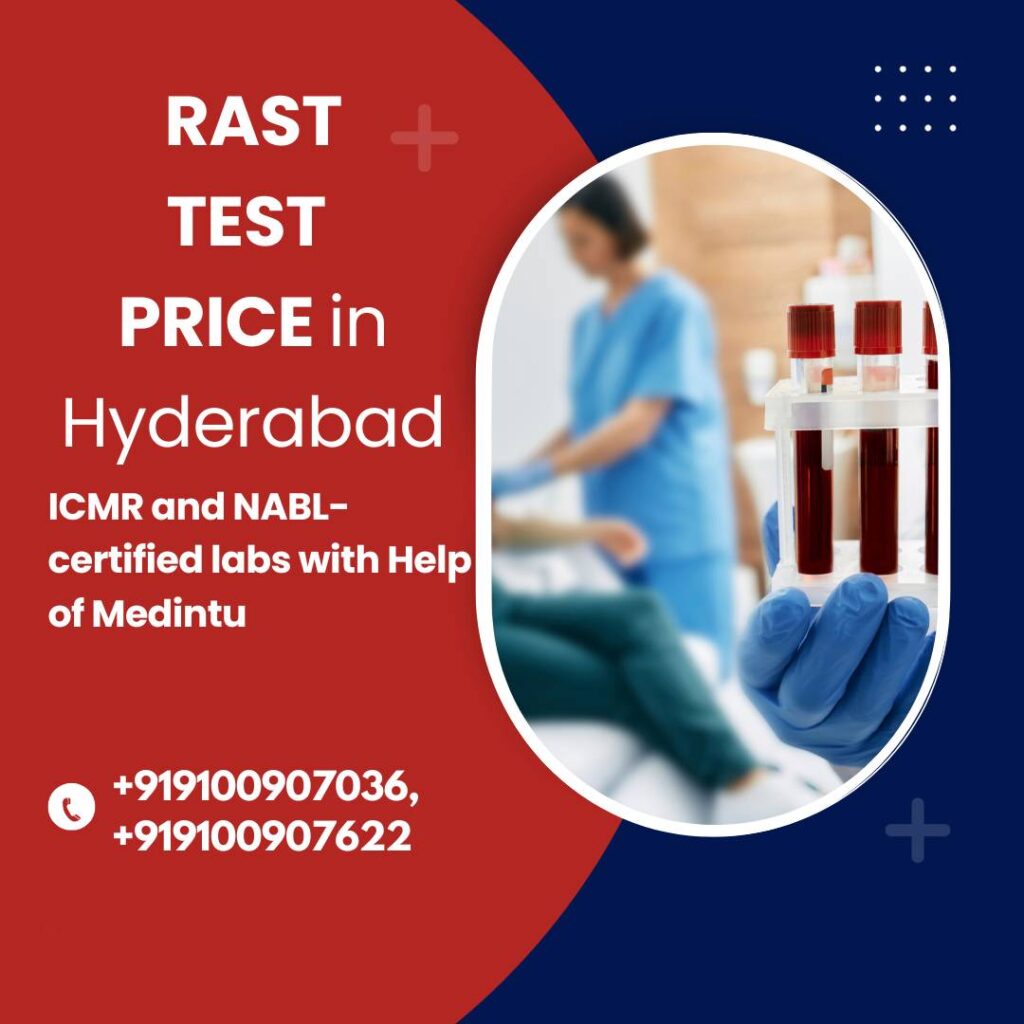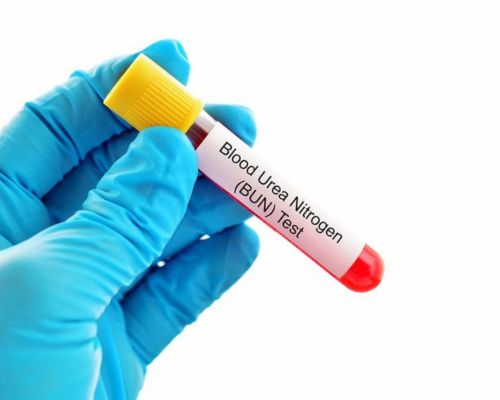Rast test at home in Hyderabad
Are you constantly sneezing or experiencing rashes after spending time outdoors? It can be frustrating to deal with allergies that seem to follow you everywhere, but there is good news. An allergy test could provide the relief you need. At Medintu, we make advanced allergy testing available to everyone at affordable rates in Hyderabad. Our Radioallergosorbent Test (RAST) can identify over 50 allergies with exceptional accuracy by simply taking a small blood sample to look for IgE antibodies that target specific allergens. Take control of your well-being today by scheduling an appointment with Medintu. in. We’re committed to prioritizing your health and making your life with fewer allergy-related issues a reality.

Fill the form to know BUN Test Price now
What is a rast test?
The Radioallergosorbent Test (RAST) was a blood test that was used in the past to diagnose allergies. The function of it was to measure the levels of Immunoglobulin E (IgE) antibodies in the bloodstream, which are produced by the immune system in response to allergens. A healthcare professional would draw a blood sample from the patient and send it to a laboratory, where it would be exposed to suspected allergens. The laboratory will measure the levels of IgE antibodies that are specific to these allergens.
RAST Test Price
Why Choose Medintu?

9,40,000+
Blood Tests done

Believed By
Doctors

NABL & ICMR
Certified labs

Home Collection
Affordable Home Blood
What makes Medintu a good choice for a Blood RAST Test at Home?
Medintu Health Solutions is a leader in providing accessible and affordable healthcare services in India. We’ve assembled a team of seasoned technicians and healthcare professionals who are committed to improving the well-being of all and ready to serve you from the comfort of your own home. We provide healthcare services that include home blood collection, nursing care, home doctor visits, and online consultations in Hyderabad.Our belief at Medintu is that quality is non-negotiable. Our partnerships with leading laboratories are renowned for their state-of-the-art facilities and cutting-edge technologies. Medintu is the choice for quick results, unwavering accuracy, and the highest standards of testing quality. Regular and rigorous quality checks are conducted in our laboratories to ensure that our standards remain at the pinnacle of excellence. Compromise is not an option for us.
Our commitment to quality is evident in every aspect of our operations. Our lab procedures are constantly reviewed and refined to maintain their top-notch status. We will not leave any stone unturned when it comes to your health.Medintu provides seamless care. Our team is responsible for managing the entire process, from collecting your sample to delivering it to the lab and updating your reports promptly. Our attention to detail ensures that you can concentrate on your well-being.
Our objective is to make healthcare accessible to everyone, transcending the barriers of affordability. Medintu is committed to ensuring that everyone’s health is not sacrificed due to financial constraints. We guarantee to give you the best and safest allergy tests, including RAST tests, without breaking the bank.Medintu is more than just a healthcare provider; it’s a trusted partner in your wellness journey. We have gained the trust of customers from all corners of India.
What is the purpose of the RAST test?
A wide range of allergens can be tested using the Radioallergosorbent Test (RAST) and its modern equivalents, such as the ImmunoCAP test. The aim of these tests is to detect specific Immunoglobulin E (IgE) antibodies in the blood, which are produced by the immune system in response to exposure to allergens. RAST and similar tests can be utilized to detect common allergens:
1] Environmental Allergens:
- Seasonal allergies (hay fever) can be triggered by pollen from trees, grasses, and weeds.
- Dust mites are tiny organisms found in household dust that can cause allergies.
- Allergies to pet dander, such as cat or dog allergens.
- The growth of mold spores in damp environments can result in allergic reactions.
2] Food Allergens:
- Peanuts are a common and potentially severe food allergen.
- Tree nuts, such as almonds, walnuts, and cashews, can cause allergies.
- Allergies to crustaceans like shrimp, crab, and lobster, or mollusks like clams and oysters.
- Eggs and egg products can cause allergic reactions.
- Milk allergies, particularly in children, are a common occurrence.
3] Insect Venom: Allergic reactions to stings from bees, wasps, and other stinging insects are caused by Bee and Wasp Venom.
4] Medications: RAST or similar tests can be used to detect allergies to specific medications, like penicillin or certain antibiotics, in certain cases.
What is the process for the RAST Test?
The general procedure for RAST testing involves these steps:
- The patient’s blood sample will be collected by a healthcare professional, typically a phlebotomist or nurse. In order to do this, a needle is typically inserted into a vein, usually in the arm.
- The serum, which is the clear liquid portion of blood, is isolated by processing the collected blood sample. The presence of antibodies, including Immunoglobulin E (IgE) in serum, is an important factor in allergy testing.
- Selection of allergen extracts: Specific allergens that are suspected of causing allergic reactions in the patient are selected. Pollen, dust mites, specific foods, or other potential triggers are among the allergens that could be present. Extracts of these allergens are prepared for testing.
- Incubation involves mixing the patient’s serum with the allergen extracts in a laboratory setting. If the patient has IgE antibodies in their serum that react with these allergens, they will bind together.
- The level of IgE antibodies bound to the allergens will be measured by the laboratory technicians. In the case of the RAST test, this measurement often involved the use of radioisotope-labeled antigens that could bind to IgE antibodies, making it possible to quantify the bound antibodies.
When should one get a rast test?
Here are some situations where a RAST test may be recommended:
- Allergy Symptoms: If you are experiencing common allergy symptoms such as sneezing, runny or stuffy nose, itchy or watery eyes, skin rashes, hives, wheezing, coughing, or difficulty breathing, and you suspect that these symptoms may be due to allergies, it may be a good time to consider an allergy test.
- Unexplained Symptoms: Sometimes, individuals may have symptoms that are difficult to attribute to a specific allergen. In cases where the cause of the symptoms is unclear, an allergy test can help identify potential allergens.
- Severe Allergic Reactions: If you have a history of severe allergic reactions (anaphylaxis) to certain foods, insect stings, medications, or other substances, an allergy test can help confirm the specific allergen that triggers these reactions. This information is crucial for managing and avoiding potential life-threatening situations.
- Chronic or Recurrent Symptoms: Chronic or recurring allergy symptoms that affect your quality of life may warrant allergy testing to identify the underlying triggers and develop an effective treatment plan.
- Prior to Immunotherapy: If you are considering allergen immunotherapy (allergy shots) as a treatment for your allergies, your allergist may recommend allergy testing to determine the specific allergens to include in the treatment.
- Food Allergies: In cases of suspected food allergies, especially if you have experienced adverse reactions after consuming certain foods, allergy testing can help confirm the presence of food allergies and identify the specific allergenic foods.
- Environmental Allergens: If you suspect that environmental factors, such as pollen, dust mites, or mold, are causing your allergy symptoms, testing can help pinpoint these allergens.

Popular lab tests near you in Hyderabad
Other Health Services in Hyderabad
At Home Health Services
X-ray at Home in Hyderabad / Ecg at Home in Hyderabad / Doctor at Home in hyderabad/ Injection at Home in Hyderabad/ Blood test at home
Physiotherapy at home in Hyderabad / Home Care services in hyderabad / Vaccination at home in Hyderabad / Ultrasound scan in hyderabad /Ct Scan in hyderabad
Medical Equipments for rent
Hospital Beds on rent in Hyderabad / Wheelchair on rent in Hyderabad / Walker on rent in Hyderabad / Oxygen Concentrator on rent in Hyderabad
FAQs
What is the objective of a RAST test?
The RAST (Radioallergosorbent test) is a laboratory test that is conducted on blood. The test measures the quantity of specific IgE antibodies in the blood that are present in a “true” allergic reaction.
What is a positive RAST test?
The RAST findings will be reported by most labs on a scale that ranges from 0 to 5 or more. A 0 value indicates that there is a low probability of an allergy.
Can a RAST test be utilized for individuals with asthma?
Adults and children with persistent asthma symptoms should undergo allergy testing, as recommended by the Centers for Disease Control and Prevention.
What are the types of RAST tests?
RAST test is a broad term that encompasses multiple tests that detect allergies to specific allergens using IgE. Some of them are listed below
- A gel or liquid base is used in the ImmunoCAP test to measure the concentration of IgE in the blood.
- Multiplex array technology can detect multiple antigens at the same time.
- Component resolved Diagnostics is an advanced test that can detect allergies to other items based on allergies to one due to shared proteins.
- Microarray tests have the ability to test for multiple allergens by using blood samples and fluorescent agents.
- The skin prick test involves contact with specific allergens through topical application of antigens and observation of skin reactions.
- The combination of these highly sensitive tests provides the best overall picture of allergies.
What allergens can be detected by a RAST allergy test?
A large number of allergens can be identified by a RAST allergy test, such as:
- Environmental allergens such as dust, mites, pollen, grass, and fungi spores.
- Food allergens such as peanuts, shellfish, soy, wheat, milk, and eggs.
- Allergies caused by pets, such as dander from dogs, cats, and farm animals.
- Insect allergens that come from insects such as ants and cockroaches.
